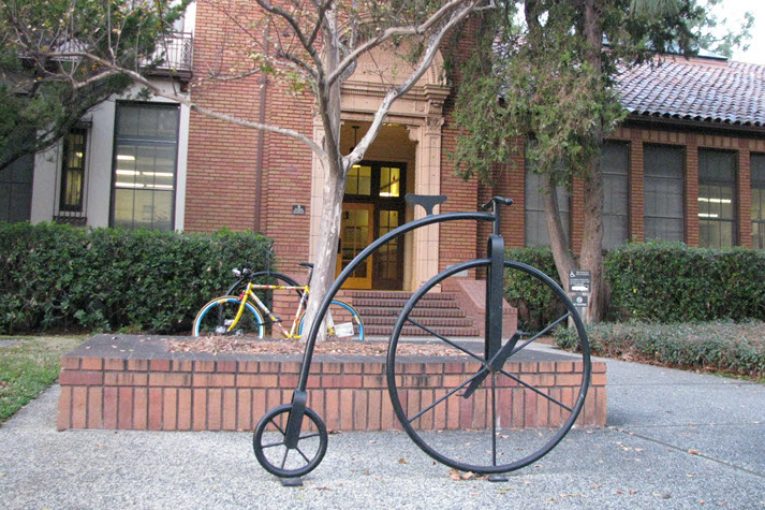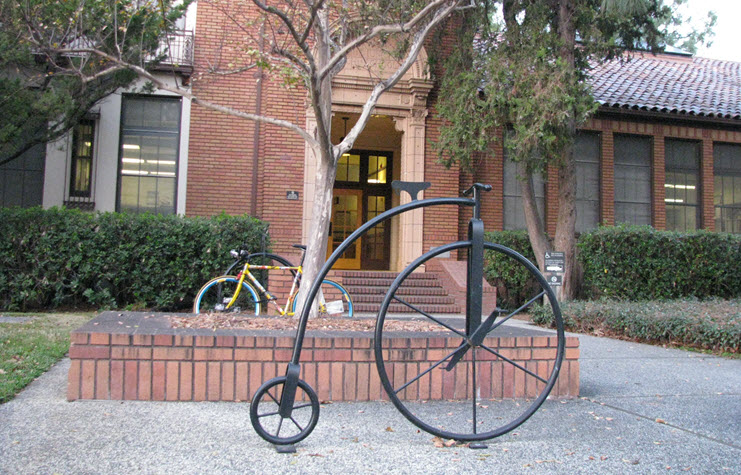

In May, there will be a special election to fill the vacancy in the 3rd District left by the departure of Lucas Frerichs to the County Board of Supervisors.
Filing to compete for that seat are two candidates: Donna Neville and Francesca Wright. Each week between now and the election, the Vanguard will pose the candidates weekly questions in which they have between 250 and 350 to respond.
Question 1: Identify your top three priorities if you are elected in May
 Francesca Wright
Francesca Wright
HOUSING – I will work with my fellow City Council Members, our Planning Commission and staff, the Davis Joint Unified School District, communities of faith, and local non-profits to develop specific local plans for expanding housing options for all incomes. I will champion a study to identify and address barriers to infill housing. I will advocate for state policy that the University of California campuses also be required to contribute their fair share to meeting the regional housing allocation.
DELIVERING HIGH QUALITY SERVICES – We must fully staff our Department of Housing and Social Services so we can access federal and state program dollars to develop programs for first-time homebuyers, rental assistance, and safe housing for the unhoused. We need sufficient emergency responders trained in trauma-informed care to be able to de-escalate situations and connect those in crisis to services. Our overreliance on external consultants for Planning and Building Departments tasks weakens our capacity to accumulate, incorporate and integrate local  knowledge. As we implement our Climate Action and Adaptation Plan, decrease our reliance on fossil fuels, expand production of local clean energy, and develop strategies to reduce vehicle miles traveled, we will rely on city staff’s local knowledge and relationships with our commissions and civic leaders. We need reasonable compensation and incentives to enable our public employees to reside in Davis.
knowledge. As we implement our Climate Action and Adaptation Plan, decrease our reliance on fossil fuels, expand production of local clean energy, and develop strategies to reduce vehicle miles traveled, we will rely on city staff’s local knowledge and relationships with our commissions and civic leaders. We need reasonable compensation and incentives to enable our public employees to reside in Davis.
REVITALIZE DAVIS IDENTITY – I will reinvigorate the Davis identity as a community with bold ideas and where people connect to one another and the world. We are rich with vibrant public art, access to wild places, and diverse and delicious food. Our galleries, museums and artist cooperatives are top-notch and under-visited. Let’s venture beyond our greenbelt walks to explore the city’s 240 acres of open space, ponds, and wildlife habitats. Let’s celebrate the array of family-run restaurants. Let’s grow businesses by working with local nonprofits to have incubator programs for food businesses and for sustainable farms. Let’s work with UC Davis to place innovative food technology enterprises here in Davis.
 Donna Neville
Donna Neville
Fiscal Resiliency and Providing City Services:
Our city simply doesn’t have enough money to provide the services our community would like to have. I understand public finance, and serving on the Finance and Budget Commission gave me a detailed understanding of our city’s fiscal situation. There I made recommendations that saved the city money without reducing services, and I would bring this approach to my work on city council. I will promote proactive economic development and strengthen our relationship with UCD so that we retain and develop the innovative talent produced on campus in the form of new businesses. Bringing in new sources of revenue is what will allow us to continue to provide desired city services and make needed improvements.
Homelessness and Housing:
Addressing homelessness will take a collaborative community effort, working with existing non-profits, interfaith groups, and others, to put in place the resources needed. I will ensure that the new Department of Social Services and Housing has the resources necessary to be effective and will support that department, including efforts to streamline the acceptance of Housing Choice Vouchers. Some of the many actions the city can take to make housing more available and affordable include: promoting the development of affordable and mixed-income infill housing; identifying a revenue source for the Housing Trust Fund that will provide an incentive to build more affordable homes; and working with the university to ensure that it provides its fair share of student housing.
Climate Change:
If elected, I will champion the implementation of the Climate Action and Adaptation Plan. To reach our goal of carbon neutrality without putting undue financial burden on our community, we need prioritization of the actions outlined in the CAAP based on impact, analysis to identify funding sources and incentives, and extensive community outreach and education so that everyone understands the importance and the value of taking the actions outlined in the CAAP. Next comes the hard work of adopting the ordinances that implement the plan and I have the experience needed to put that plan into action.






.
I don’t get to vote in this May election, but these answers from Cesca and Donna give me a very good feeling that no matter which of them wins, the voters will be well served.
As you can see from their answers, there are significant differences in what they respectively believe are the most important issues. That presents real choices for the voters, which is a good thing.
The one issue the both highlighted was housing. The above quote from Cesca’s answer indicates she isn’t just going to moan about “the problem” and is not afraid to propose a real solution that has the potential to free up thousands of rental beds in Davis that can be rented by families and Davis workers. That is leadership.
I hope Donna and Cesca both state a clear position that the Davis City Council should rescind the decision to go to district elections , and return to at large City-wide Council elections. The winner-take-all method that comes with district elections actually makes it harder for a “defined interest group” candidate to get elected. The reason is the homogeneity of the dispersion of interest group individuals across the city. Having the ability to come in second or third and still be elected is much less of a hill to climb.
I find it humorous, and a little bit sad, that Matt’s idea of a ‘real solution’ to the housing shortage is to blame the University for Davis’ decades long failure to build sufficient housing. Whether or not the University builds housing today has no impact on the responsibility of the City to provide for appropriate housing, or to have provided that housing all along. Blaming others for problems we created is not an example of ‘leadership,’ it is simply ‘passing the buck.’ I certainly hope these two candidates have a better understanding of leadership than what Matt has demonstrated.
Mark, go back and reread Francesca’s statement. Nowhere in it does she blame anyone. She doesn’t look backward. She looks forward. Do you disagree that the proposal that the UCs have a RHNA requirement is a solution for increasing the housing supply in California? Do you disagree that the UCs having to provide Affordable housing is a solution? If you do disagree, please explain your logic.
now with respect to your “responsibility of the City to provide for appropriate housing” statement, the history of housing growth in Davis shows that Davis proportionally provided a significantly above average amount of incremental housing supply for well over three decades. Unfortunately, UC Davis enrollment grew at an even faster rate, and the result was that UCD students outcompeted non-students for the available new housing, and squeezed non-students out of the existing housing.
”We” did not create the problem. “We” had no say in any decisions about UCD enrollment or enrollment growth. “We” also were bystanders when UCD students, with greater personal financial resources outbid non-students for existing and new housing.
You were so busy obsessing about the messenger, you failed to either understand or address the message. In the universe of fallacies, that is called ad hominem.
As Andy Reid often says … “Time’s yours.”
I was talking about you Matt, and your failings, no one else.
You are right, you did not create the problem since you do not live here. “We”, as in, those who live in the City, did create the problem. Perhaps that suggests a solution, perhaps we should stop listening to silly outsiders like you with no skin in the game.
.
Thank you Dr. West. Your insight is much appreciated. I believe you will find that I do not play the Blame Game. I have proposed a solution that has the potential to free up thousands of rental beds in Davis that can be rented by families and Davis workers.
What solution do you propose for meeting the challenge that the low income Affordable housing RHNA allocation poses?
Further, what solution do you propose to address the conundrum that Don Gibson described last Thursday in his comment below?
.
In closing, how did those who live in the city create “the problem”?
“…housing growth in Davis shows that Davis proportionally provided a significantly above average amount of incremental housing supply for well over three decades. Unfortunately, UC Davis enrollment grew at an even faster rate, …”
Above average but under what has been needed because of UCD growth. In other words Davis failed to provide the housing the community needed. Comparing Davis to non-host communities is meaningless. UC Davis is driving growth regionally, it is the largest employer in the county. Facilitating that growth, so that more people can enjoy the benefits of the prosperity UC brings to the city and county, is what normal communities would do. The city of Davis’ failure to grow with it is a huge policy failure of the City of Davis. The County of Yolo is also complicit by having a policy of deferring to the cities on growth issues.
UC has no intention of slowing its growth at UCD, nor should they. The benefits to society beyond Davis are too great for UC to stop. A decade ago Chancellor Katehi spelled it out and invited Davis to participate but warned UC would go around Davis if the city continued to be obstructive. Davis ignored Katahi and the housing problem has become worse and worse. Davis has no one to blame but itself for lagging UCD’s growth rate. Locals can try to get UC to do more to house its students on campus but why should UC care about Davis when Davis doesn’t care about UC?
The truth is that the growth rate of Davis should mirror that of UC. The two communities are inextricably tied together by proximity. Doing otherwise is an invitation for failure to provide adequate housing for the community as we have seen.
That period of rapid (“above average”) growth ended over 20 years ago. Measure J has significantly curtailed housing growth here compared to the region, during a period in which UCD substantially increased enrollment.
I don’t disagree with that assessment Don, but I suspect the high growth numbers continued into the 2000’s, so over 20 years is probably more accurately stated as just under 20 years. However, with that said, I believe Mark has cherry picked his numbers to support his ad hominem argument. If one looks at the new units added numbers over the past 50 or 60 years, I suspect Davis’ growth is above the median and/or average new units added growth rate of California cities.
It is also worth noting that for the decade from 2007 to 2016 the new units being added throughout the State were depressed thanks to the housing bubble bursting.
with that said, nothing that has even said here changes the fact that Nowhere in Francesca’s statement does she blame anyone for the current housing challenges we face in Davis. She doesn’t look backward. She looks forward. I will ask you the same two questions I asked Mark West. Do you disagree that the proposal that the UCs have a RHNA requirement is a solution for increasing the housing supply in California? Do you disagree that the UCs having to provide Affordable housing is a solution? If you do disagree, please explain your logic. So far Mark has chosen to duck those two questions.
Albeit with much reluctance, I’ll reply:
It is not necessary. The housing that UCD provides should be a part of the county’s RHNA #’s since they are in the county.
It would be reasonable for the state legislature to urge UC to provide more affordable housing for the students who live on campus, and our local legislators can certainly press that point. Worth noting that the state only provides about 11% of UC’s budget, so there isn’t much leverage there. And housing is not a core mission of the University of California.
Since UCD has committed to supplying housing in the MOU with the city, and so far as we know they are keeping to their commitment, Mark is quite correct that this is just passing the buck. Generally speaking, employers are not responsible for providing housing for their staff and customers.
That is a ridiculous time frame.
I’m not sure what the reluctance is, but thank you for your thoughtful response.
.
It would be nice if we knew that was the case, but we don’t have any documentation that shows the numbers that are the result of that happening.
.
UCD has signed multiple other MOUs and then failed to abide by the commitments therein … commitments respectively to the City and to the Regents & the other UCs. Have any metrics been published since this most recent MOU was signed that show how much progress UCD has been making in abiding by the terms of the MOU? Some transparency on that score would be trust-building. Relying on “as far as we know” does not inspire confidence.
.
It is only passing the buck if you are looking at the possible solutions from an either/or perspective rather than a both/and perspective. Having The UCs treated the same as any other jurisdiction does not give the other jurisdictions a free pass to not address their RHNA allocations.
Further, if the goal is to actually produce additional, incremental new housing, the UCs have much greater access to capital, and for the most part much more discretionary control of available land to build on than cities do. Said another way, the UCs have far fewer barriers to success in producing housing than the private sector does.
.
I agree generally speaking. However, generally speaking, employers don’t provide dormitories either. So a standard of “generally speaking” does not seem to be appropriate in this case. Definitely appropriate in other cases, but not in this one. If you disagree, please share your logic.
My publicist has been ill, so perhaps most folks missed the announcement of the new related agreement I brokered between the City of Davis, UC Davis and Yolo County. It consists of a single directive:
“All spaces within a fifteen minute walk of Memorial Union or the intersection of E St and 3rd St which can have dense housing of at least 4 to 6 stories in height, at least 33% affordable (in all categories). This will include single-story light industrial and/or low-performing structures, commercial parking lots and trailer parks. It will exclude historical structures, so-called single family housing (except opt-in, and then with lower height mandates) and will have very minimal parking for vehicles and landscape and resource designs that meet or exceed CAAP.”